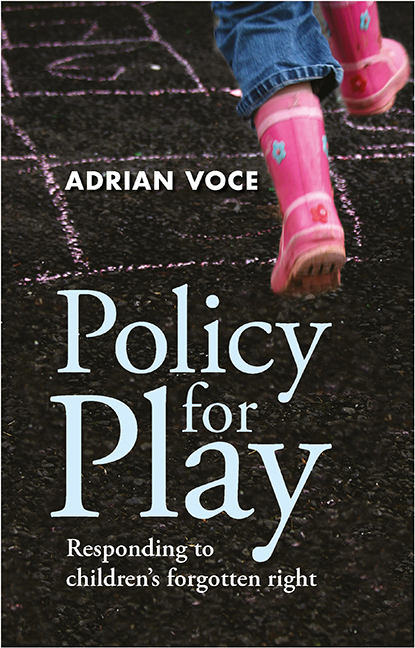Book contents
- Frontmatter
- Dedication
- Contents
- Who’s who
- About the author
- Preface
- Foreword
- Prologue
- Introduction ‘To respect, protect and fulfil’
- one ‘To play and to dream’ • Restoring play to the heart of the campaign for children’s rights
- two ‘For a change’ • Finding the evidence for play policy
- three ‘Advocates for play’ • Playwork’s place at the heart of the play movement
- four ‘New opportunities’ • Lottery funding and the beginnings of public play policy
- five ‘A vital and vibrant city’ • How devolved government in London set a benchmark for play policy
- six ‘Making the case’ • The call for a national play strategy
- seven ‘Things to do, places to go?’ • How play was overlooked by children’s services reform
- eight ‘Getting serious’ • The national play review
- nine ‘Lottery millions’ • The Children’s Play Initiative
- ten ‘Dirt is good’ • The Play England project
- eleven ‘The best place in the world’ • The Play Strategy for England
- twelve ‘Playbuilders’ • Breaking the mould of the public playground
- thirteen ‘Everyday adventures?’ • Austerity brings an end to play policy in England
- fourteen ‘Skylarks and canaries’ • The legacy of the Play Strategy
- fifteen ‘Children now’ • Responding to children’s right to play: conclusions and recommendations
- Epilogue
- References
- Index
eleven - ‘The best place in the world’ • The Play Strategy for England
Published online by Cambridge University Press: 08 March 2022
- Frontmatter
- Dedication
- Contents
- Who’s who
- About the author
- Preface
- Foreword
- Prologue
- Introduction ‘To respect, protect and fulfil’
- one ‘To play and to dream’ • Restoring play to the heart of the campaign for children’s rights
- two ‘For a change’ • Finding the evidence for play policy
- three ‘Advocates for play’ • Playwork’s place at the heart of the play movement
- four ‘New opportunities’ • Lottery funding and the beginnings of public play policy
- five ‘A vital and vibrant city’ • How devolved government in London set a benchmark for play policy
- six ‘Making the case’ • The call for a national play strategy
- seven ‘Things to do, places to go?’ • How play was overlooked by children’s services reform
- eight ‘Getting serious’ • The national play review
- nine ‘Lottery millions’ • The Children’s Play Initiative
- ten ‘Dirt is good’ • The Play England project
- eleven ‘The best place in the world’ • The Play Strategy for England
- twelve ‘Playbuilders’ • Breaking the mould of the public playground
- thirteen ‘Everyday adventures?’ • Austerity brings an end to play policy in England
- fourteen ‘Skylarks and canaries’ • The legacy of the Play Strategy
- fifteen ‘Children now’ • Responding to children’s right to play: conclusions and recommendations
- Epilogue
- References
- Index
Summary
On a sunny south London morning in March 2008, on a leftover piece of urban land – a brownfield site in the planning jargon, but one long since colonised by playing children – there is an unusual spectacle.
Four middle-aged men in suits and ties are swinging, two of them in tandem, in long, high arcs. Clinging for all they were worth to thick, sturdy lengths of rope suspended from homemade, brightly painted wooden structures made from old telegraph poles and assorted planks of scrap wood, the men appear tentative at first, clumsy and ungainly in their buttoned up shirts, shiny shoes and politician manners. It seems certain that one or more of them will lose his grip; crashing his bones, dignity, and very likely his career into the rubble and nettles below. There are no safety surfaces here.
Gradually, though, the men’s confidence visibly increases as they seem to recall long-forgotten skills. Nervous pleasure turns to something close to unrestrained glee; they begin to enjoy themselves. Concentrated on the physical immediacy and real challenge of these monster swings, they become lost in the moment. For a few minutes these serious, powerful men forget how important they are and what they might look like in the newspapers the next day. They remember how to play.
More grown-up looking people, about 30 of them, equally unsuitably attired for the ramshackle environment in which they find themselves, take photographs and videos, make notes on clipboards, look anxiously at watches, speak over-excitedly on mobile phones or just look on, nervously. A group of children marched in for the occasion from a nearby primary school wait on the periphery looking bored. Still the men play on their swings, laughing now and egging each other on until, anxiously, one of the onlookers gesticulates that they should stop. It is time to get on with the business of the day.
Ed Balls, Secretary of State for Children, Schools and Families, was perhaps to later regret his few minutes of fun at Slade Gardens Adventure Playground. One of the videos of he and Andy Burnham, the Culture Secretary, swinging together from the same dual swing structure, was widely shown on TV news reports, mainly as the lighthearted item to sign off a bulletin before the weather forecast. The item attracted a degree of ridicule, not just from opponents but also from the political commentariat in general.
- Type
- Chapter
- Information
- Policy for PlayResponding to Children's Forgotten Right, pp. 107 - 116Publisher: Bristol University PressPrint publication year: 2015



